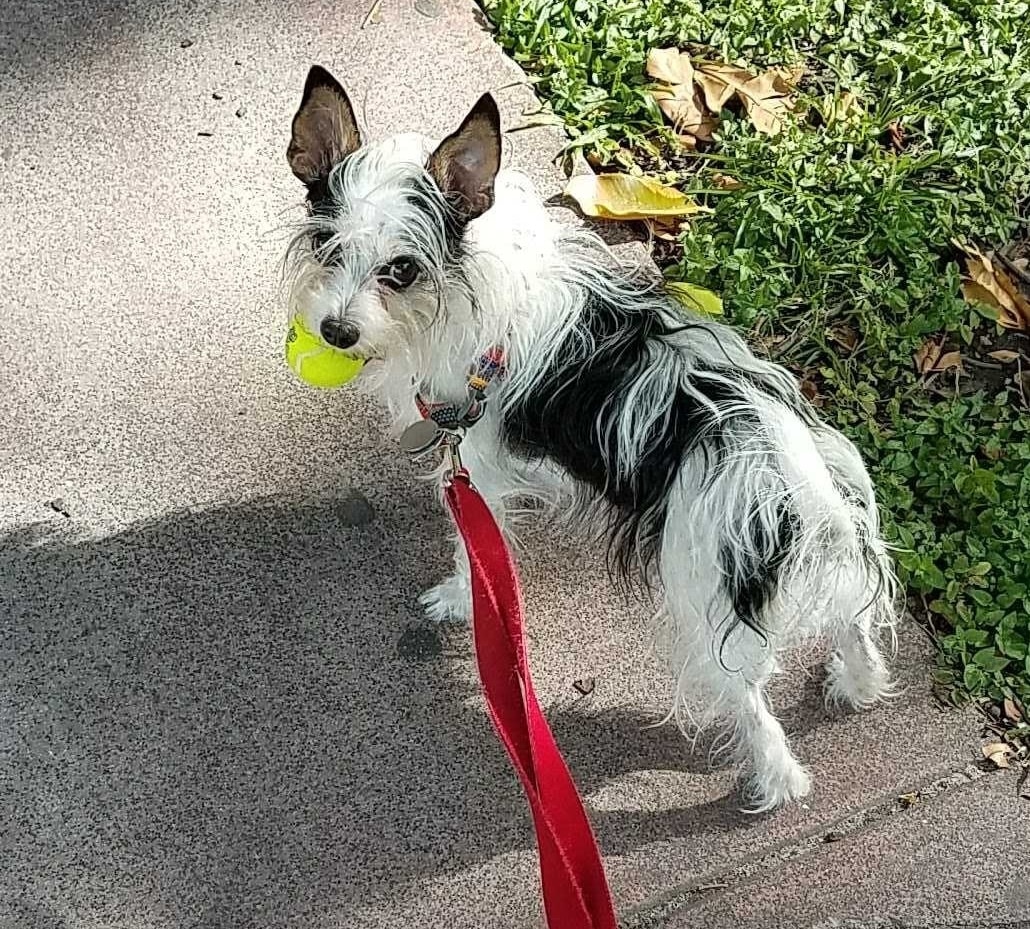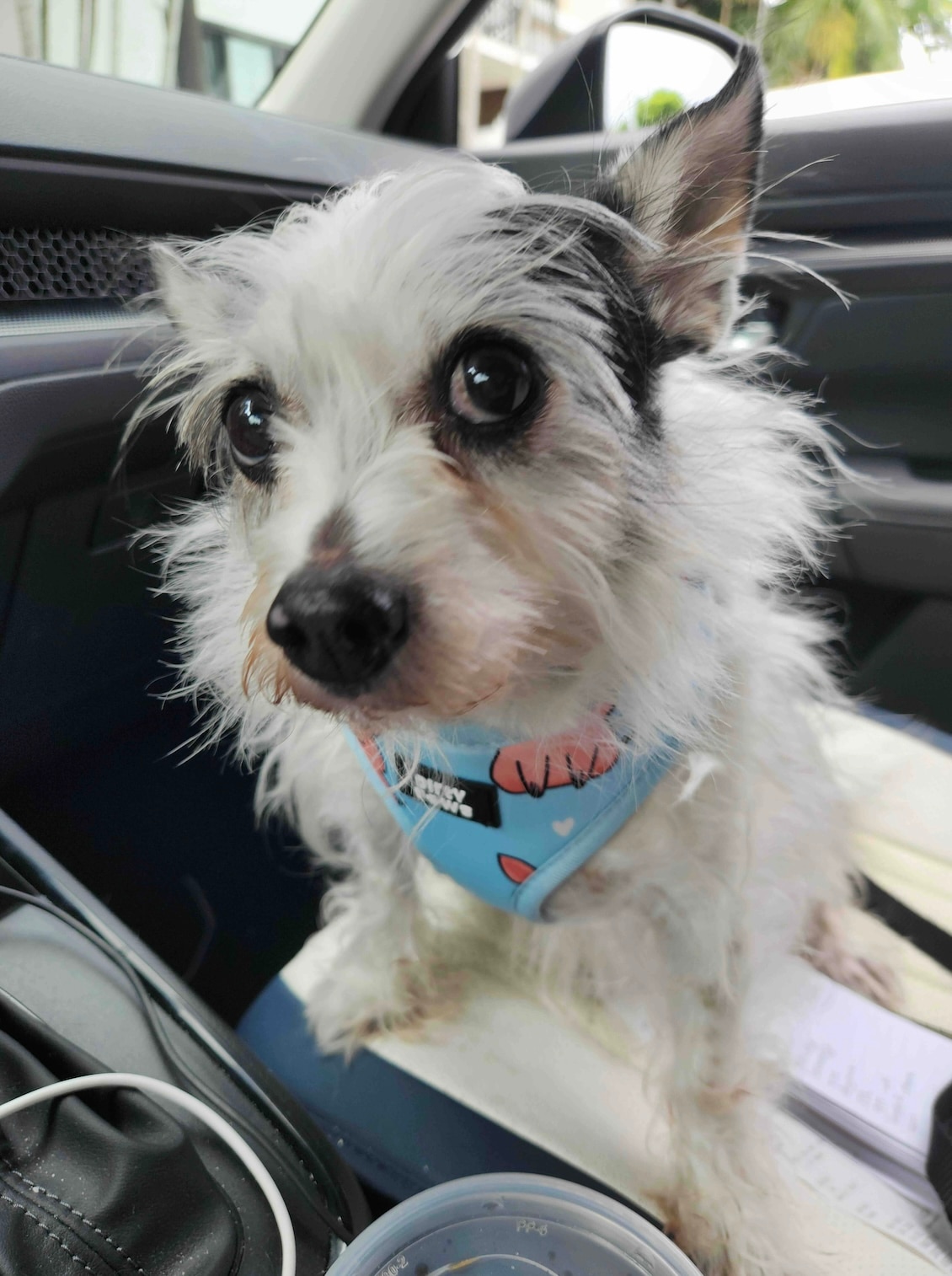Chipoo
Adobe Stock/annette shaff
The Chipoo is a mix between two well-known breeds of international significance: the Chihuahua, a national symbol of Mexico, and the Poodle, the national dog of France. But despite their impressive parentage, Chipoos are not yet recognized by the American Kennel Club (AKC).
Without a Chipoo dog breed standard, it’s difficult to make sweeping statements regarding this mixed breed’s temperament and appearance. However, the parents provide a helpful foundation for making predictions about Chipoo dogs.
Topping out at 6 pounds, Chihuahuas are big dogs—at heart, that is. Members of the unofficial “purse dog” family, these pint-sized pooches are as compact as they are confident, and they have strong convictions that you’d like them by your side (or on your lap) at all times.
The athletic Standard Poodle, on the other hand, was originally bred not for lap lounging, but for the difficult job of retrieving fowl from icy waters during duck hunts. And while Chipoos typically have either a Miniature Poodle (10–15 pounds) or a Toy Poodle (4–6 pounds) parent, these smaller dogs are no less intelligent or agile than their Standard Poodle ancestors.
You can generally expect a Chipoo dog to be small-space friendly, first-time pet parent friendly, and just plain friendly.
Caring for a Chipoo

Chihuahua-Poodle mixes are smart, adaptable, compact pups, and a full-grown Chipoo dog can weigh 4–15 pounds. Chipoos can do well in a variety of settings, but their needs require thoughtful consideration.
First, though lap-size, Chipoos aren’t necessarily lap dogs. Both parent breeds are relatively high in energy, and Poodles in particular need plenty of mental stimulation and physical exercise each day. But thanks to the Chipoo’s small stature, this can be done indoors.
Affectionate and fun, Chipoos can make friends with people of all ages. In fact, close companionship is key to their happiness. However, their tiny size warrants caution. Very small children and very large dogs can accidentally harm the little Chipoo, so any interactions should be closely supervised.
A Chihuahua-Poodle’s grooming needs are relatively minimal, and both parent breeds are fairly low on the shedding spectrum. Poodles are regularly described as being allergy-friendly, but keep in mind that no dog is truly hypoallergenic.
Chipoo Health Issues
Both Chihuahuas and Poodles are healthy dog breeds with life expectancies of 14–16 years and 10–18 years, respectively. You can expect the Chipoo’s lifespan to fall within these ranges.
Still, like all dogs, the two breeds are prone to various health conditions that can be passed to their Chipoo puppies.
Patellar Luxation
When the patella (kneecap) shifts outside its normal groove within the femur (thigh bone), it’s called patellar luxation. This condition is more prevalent in smaller breeds, including the Chipoo. A luxating patella might not cause problems in all dogs, but severe cases may require surgery.
Signs of patellar luxation include:
-
Limping that often comes and goes
-
Bunny-hopping gait
-
A popping or cracking noise from the knee joint
Tracheal Collapse
The trachea, also called the windpipe, is a tube of cartilage and membrane that carries air from the back of the mouth to the lungs. If the cartilage weakens or the membrane stretches out, the trachea’s shape flattens. This is called tracheal collapse, and both Chihuahuas and Toy Poodles carry an increased risk of developing this condition.
Dogs affected by tracheal collapse have a recurring, honk-like cough that worsens with:
-
Exercise
-
Heat and humidity
-
Excitement
-
Stress
-
Eating and drinking
-
Using a neck collar
Many dogs do well with medical management, but surgery is sometimes needed in severe cases. Dogs with tracheal collapse also benefit from wearing a harness instead of a neck collar.
Legg-Calve-Perthes Disease
Legg-Calve-Perthes disease is a condition in which the head of the femur bone deteriorates. This causes the hip joint to break down, leading to bone and joint inflammation (osteoarthritis).
While the exact cause is unknown, Legg-Calve-Perthes most often affects small-breed dogs. Many affected dogs require surgery, followed by a rigorous exercise and physical therapy regimen. Dogs with this condition tend to recover well.
Signs of Legg-Calve-Perthes disease include:
-
Gradual lameness
-
Lifting affected limbs when walking
-
Pain when moving the hip joint
-
Loss of thigh muscle on affected limbs
Dental Disease
Periodontal disease is a progressive condition wherein bacteria accumulate in the mouth, leading to damage to the dog’s gums, bones, and other tissues. While the disease is common in all dogs, small and toy breeds are especially prone.
Frequent at-home tooth brushing (ideally every day) and professional dental cleanings at your vet’s recommendation are the best way to prevent dental disease.
What To Feed a Chipoo

There’s no one-size-fits-all recommendation for feeding your Chipoo dog. Work with your veterinarian to develop a feeding plan that’s nutritionally complete and balanced for your pup’s life stage—puppy, adult, or senior—weight, and health. Even the size of kibble is important, as the Chipoo’s small teeth need small kibble.
Make sure your dog’s food meets the standards set by the Association of American Feed Control Officials (AAFCO). This ensures your Chipoo pup gets all the nutrition they require.
How To Feed a Chipoo
Chipoo puppies need frequent meals—three or four a day—to avoid hypoglycemia (low blood sugar). Full-grown Chipoo dogs can be fed two or three times a day. Your vet can help you determine the best feeding schedule for your dog’s age.
How Much Should You Feed a Chipoo?
If you’re wondering how much to feed your dog, take a look at the food packaging. The nutrition label includes a feeding guide that gives you a general idea of portion sizes based on your dog’s weight.
Your veterinarian can give you more specific guidance based on your Chipoo’s weight, body condition score, lifestyle, and health needs.
Keep in mind that dog treats have calories, too, and they should not make up more than 10% of your dog’s daily calorie requirements.
Nutritional Tips for Chipoos
If your Chipoo is eating an AAFCO-compliant complete and balanced diet of dog food, they shouldn’t need supplementation in their diet. That said, dogs with certain conditions—such as a luxating patella—may benefit from supplements.
Chipoos can also benefit from dental chews due to their risk of periodontal disease. But talk to your veterinarian before adding anything new to your dog’s diet, including supplements.
Behavior and Training Tips for Chipoos
Chipoo Personality and Temperament
As with all mixed-breed dogs, your Chipoo will be a combination of their parents. They may be sassy and alert like their Chihuahua parent; active, agile, and social like their Poodle parent; or a combination of the two.
Despite their personality differences, both Chihuahuas and Poodles are aligned in being highly affectionate, playful, and adaptable. As such, Chipoos need daily opportunities to interact with their pet parents, and to engage their bodies and brains in play.
Affectionate and fun, Chipoos can make friends with people of all ages. In fact, close companionship is key to their happiness.
Chipoo Behavior
Whether your Chipoo behaves more like a lap dog or a duck-hunting companion, you can expect them to want your attention—and lots of it. Close companionship is paramount, and bored, lonely Chipoo dogs with energy to spare will be more likely to engage in unwanted behaviors like excessive barking (a talent both of their parent breeds share).
Chipoo Training
It’s important to safely expose your Chipoo puppy to new animals, people, environments, activities, and objects during their first 16 weeks of life.
This is a crucial learning period, and socializing your puppy can help them feel comfortable in future settings—especially if they inherit their Chihuahua parent’s wariness of strangers. Ask your veterinarian to list age-appropriate activities.
Poodles are famously intelligent and eager to learn, and your Chipoo dog can be equally brainy. A lifelong, rewards-based training approach that incorporates games and fun will build your human-animal bond, while also providing much-needed mental and physical exercise.
Fun Activities for Chipoos
-
Skills training
-
Fetch
-
Hide-and-seek
-
Nose work
Chipoo Grooming Guide
Poodles have long, curly hair that needs regular attention, while Chihuahuas have smooth coats that range from short to medium in length and need minimal care. Your Chipoo will inherit one of these coat types or a mix of the two.
Coat Care
Specific coat care depends on which parent breed your Chipoo takes after. But in general, a thorough brushing at least twice a week should be sufficient to keep your Chipoo’s coat healthy and free from tangles.
Skin Care
Good coat care goes hand-in-hand with good skin care. Matting can trap moisture, debris, and other irritants next to your Chipoo’s skin, so it’s important to keep their hair free from problems with regular brushing.
Ask your veterinarian how often you should bathe your dog. Bathing your pup too often can strip their skin of healthy oils and lead to dryness and itchiness.
Eye Care
To avoid irritation, keep the hair around your Chipoo’s eyes well trimmed. Call your veterinarian if you notice signs of eye problems (such as redness, discharge, or squinting).
Ear Care
The likelihood of your Chipoo developing an ear infection depends on the shape of their ears. If they stand upright and get plenty of airflow, they’re less likely to develop problems. If they fold over, there’s a greater chance for infection.
Talk to your vet about how and how often you should clean your dog’s ears and which ear-cleaning products are best. Make an appointment if you notice signs of an ear infection.
Dental Care
It’s important to brush your dog’s teeth every day with a dog-specific toothpaste and toothbrush. This is the best way to reduce the chance of dental disease in your Chipoo.
Keep up with regular veterinary exams as well. Your vet will assess your dog’s teeth and recommend a professional cleaning as needed.
Considerations for Pet Parents
Here are some questions to consider before adding a Chipoo puppy to your family:
-
Can I provide a safe environment for a dog that can be easily injured by young children or other pets?
-
Can I brush a dog’s teeth every day?
-
Am I home enough to give a dog companionship?
-
Do I have time to provide a dog with mental and physical exercise every day?
-
Do I have the skills, patience, and dedication to train a dog using positive reinforcement?
-
Am I financially prepared to provide veterinary care?
-
Can I provide a dog with a loving home for their lifetime, which could be 18 years or more?
If you can answer these questions with an enthusiastic “Yes!” you may be ready to parent a Chipoo.
Chipoo FAQs
Is a Chipoo a good dog?
The playful Chipoo may be a good dog for your family if you can provide daily companionship and exercise, patient and consistent training, and safety from larger animals and very small children who may cause accidental harm.
How big does a Chipoo get?
The Chipoo is a mix between a Chihuahua (weighing under 6 pounds) and either a Miniature Poodle (10–15 pounds) or a Toy Poodle (4–6 pounds). You can expect a full-grown Chipoo dog to weigh 15 pounds or less.
Is a Chipoo a Poochi?
Yes. Chipoo and Poochi are different names for a Chihuahua-Poodle mix.
Is a Chipoo hypoallergenic?
Chipoos are commonly considered to be hypoallergenic dogs. While there’s no such thing as a 100% hypoallergenic dog, Chipoos typically don’t shed very much and may be a good choice for some people who experience allergies.
